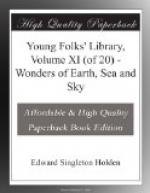[Illustration]
NOTES
AGASSIZ, J.L.R., naturalist, born in Switzerland, 1807; died, Cambridge, Mass., 1873. In 1846 he came to America, after having gained a high reputation in Europe, to deliver a course of lectures in Boston “On the Plan of the Creation,” and met with such success that he spent the rest of his days there, declining an invitation to return to his native country and to Paris. In 1848 he was elected to the chair of Natural History at Harvard. In 1850-51 he went on an expedition to the Florida Reefs. In 1858 he founded and organized the Museum of Comparative Zooelogy at Cambridge—and, later on, went on his important voyage to Brazil. In 1872 he founded and organized the summer school of Natural History at Buzzard’s Bay. He wrote “The Fishes of Brazil,” “A Study of Glaciers,” “Natural History of the Fresh Water Fishes of Central Europe,” “Contributions to the Natural History of the United States” (unfinished), and with his wife, “A Journey in Brazil.”
BALL, PROF. SIR R.S., English astronomer, born in Dublin, 1840. Was appointed Lord Ross’s astronomer in 1865. Professor of mathematics and mechanics at the Royal Irish College of Science in 1873, and is now astronomer royal for Ireland. He is the author of “The Story of the Heavens,” “Starland,” etc., and is well known as a successful lecturer on astronomical subjects in this country.
DARWIN, CHARLES R., English naturalist, born, 1809; died, 1882. He first formulated what is known as the principle of Natural Selection. In 1831 he went in the famous scientific voyage of the Beagle as naturalist, and afterwards published an account of it. He was one of the most thorough, careful, and painstaking scientific men of this or any age. He is the author of many famous books. “The Origin of Species,” “The Descent of Man,” “Insectivorous Plants,” “The Power of Movement in Plants,” “The Structure and Distribution of Coral Reefs,” “Geological Observations on Volcanic Islands.” “The Formation of Vegetable Mould” was his last published work.
FLAMMARION, C., famous French astronomer, born, 1842. He has written many popular works on astronomy, most of which have been translated into English. “The Stars,” “The World Before the Creation,” “Uranus,” “Comets,” “Popular Astronomy,” are among his best known.
HOLDEN, PROF. E.S., American astronomer, born at St. Louis, 1846. Lieutenant engineers, U.S.A., 1870-73; professor mathematics, U.S.N., 1873-81; director Washburn Observatory, 1881-85; president University of California, 1883-88; director Lick Observatory, 1888-98. Is a member of several learned societies of Europe. Is the author of a “Life of William Herschel,” “A Hand-book of the Lick Observatory,” “Earth and Sky,” “Primer of Heraldry,” “Elementary Astronomy,” “Family of the Sun,” “Essays in Astronomy,” “Stories of the Great Astronomers,” etc.




